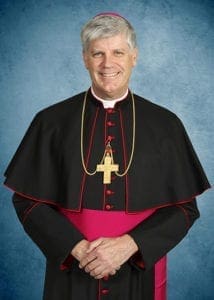Dreaming of a future full of hope
By BISHOP BERNARD E. SHLESINGER III, Commentary | Published April 14, 2023 | En Español
There is no subject that I enjoy preaching on more than the mercy of God. This is because I know that without God’s mercy, we are devoid of hope for an eternal remedy to the maladies which afflict us.

Bishop Bernard E. Shlesinger III
Without God’s mercy, we are left to look at ourselves in a critical way rather than see ourselves through the heart of God as his beloved children. The Divine Mercy aims to heal any regrets focused on past sins, console hearts experiencing miseries in the present time and provides hope when a joyful future appears doubtful.
First, God’s mercy heals the wounds of our past sins and the psychological damage because of them. I think of Adam and Eve in the Garden of Eden after the fall, living a game of hide and seek due to fear of exposure. God, however, was moving toward them, searching for them to come out into the open to experience his mercy.
After leaving paradise, they would need to leave their regrets of past failure, which Satan would wish to imprison them in, and walk in the light of God’s mercy. Like them, we must learn this lesson well as did St. Peter. The first Pope could have had on his resume ‘denied Jesus three times’ however, he never allowed himself to be defined by his past and was moved by the Divine Mercy to tend his flock.
Second, as stated in the 23rd Psalm, God’s “mercy and goodness pursues us all the days of our life.” God our Father is not waiting in heaven for us to make a confession of sin so that his justice can be rendered. God is not watching us from a distance, as if he is annoyed, but is actively seeking to share his joy with us in the present moment.
In the parable of the prodigal son, the father pursues both sons and searches for them when they are absent so that they can rejoice again in his mercy. In this parable, which is the paradigm of God’s mercy, we see no attempt at just punishments being meted out to his children but only the joy of the father when reconciliation is celebrated. Is not this joy to be celebrated with us in the sacrament of penance and reconciliation?
Third, mercy must be the impetus for moving forward into the future for we are not guaranteed of being successful at all times. We might ponder incessantly on the possibility of failure, disgrace, or persecution and never decide to act.
On Pentecost, the apostles left the Cenacle fearless of outcomes and persecution and entered into a hostile world with confidence. By the power of the Holy Spirit, they would proclaim the risen Jesus and preach God’s mercy to the world. Like them, we must not be intimidated by human weakness. We must be strengthened by God’s power and mercy to preach to a world that needs to dream of a future filled with hope.
Sometimes when I ask people how they are doing, I hear the response “living the dream.” I say quietly to myself, I hope it is a good dream because from experience I know that “living the dream” of one’s own imagining can end up in living a nightmare of one’s own making. But living in God’s mercy opens us up to a new horizon and a confidence not based on past performance or present misery. Let us dream of a beautiful future where the love of God urges us onward and God’s mercy endures forever.